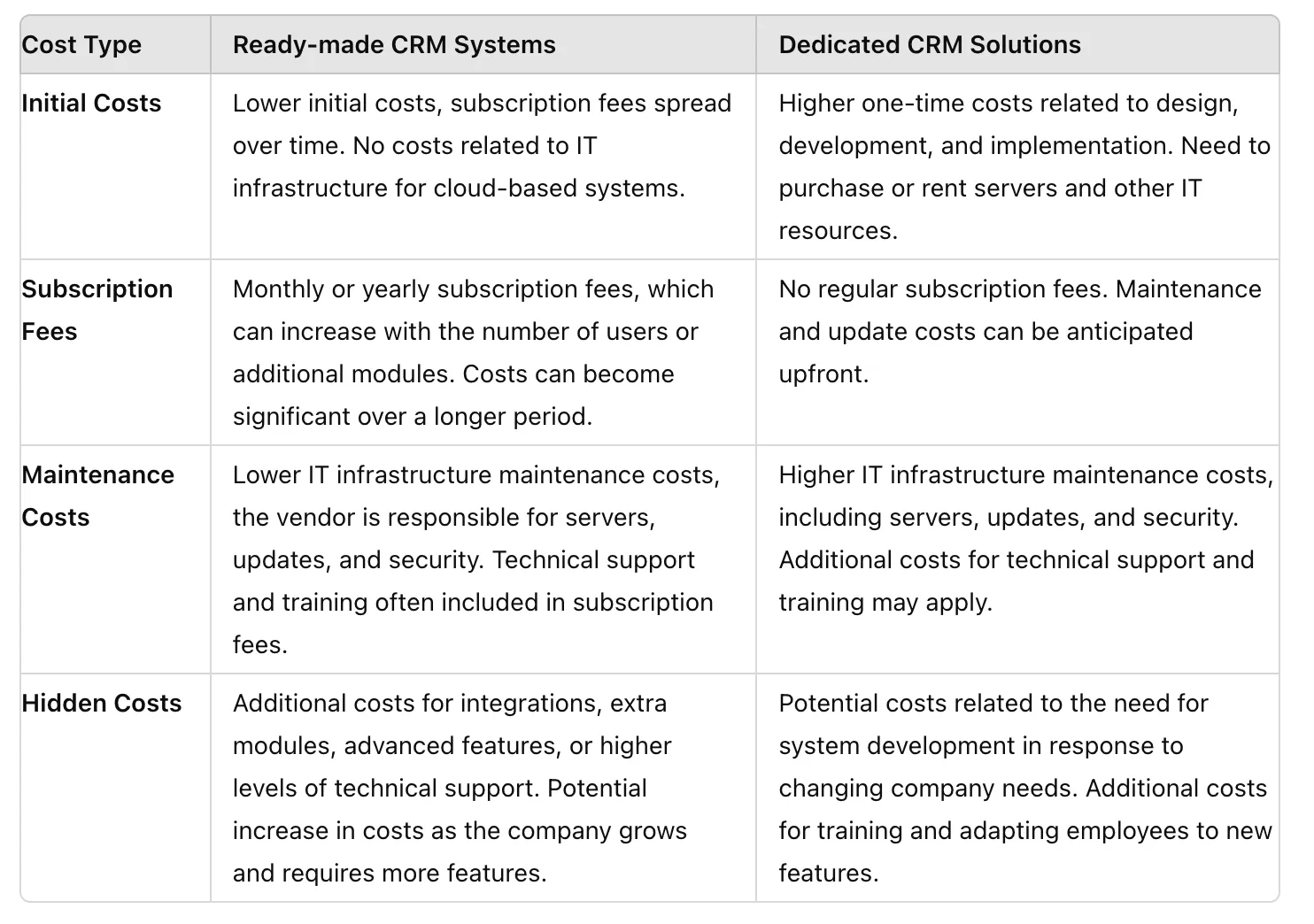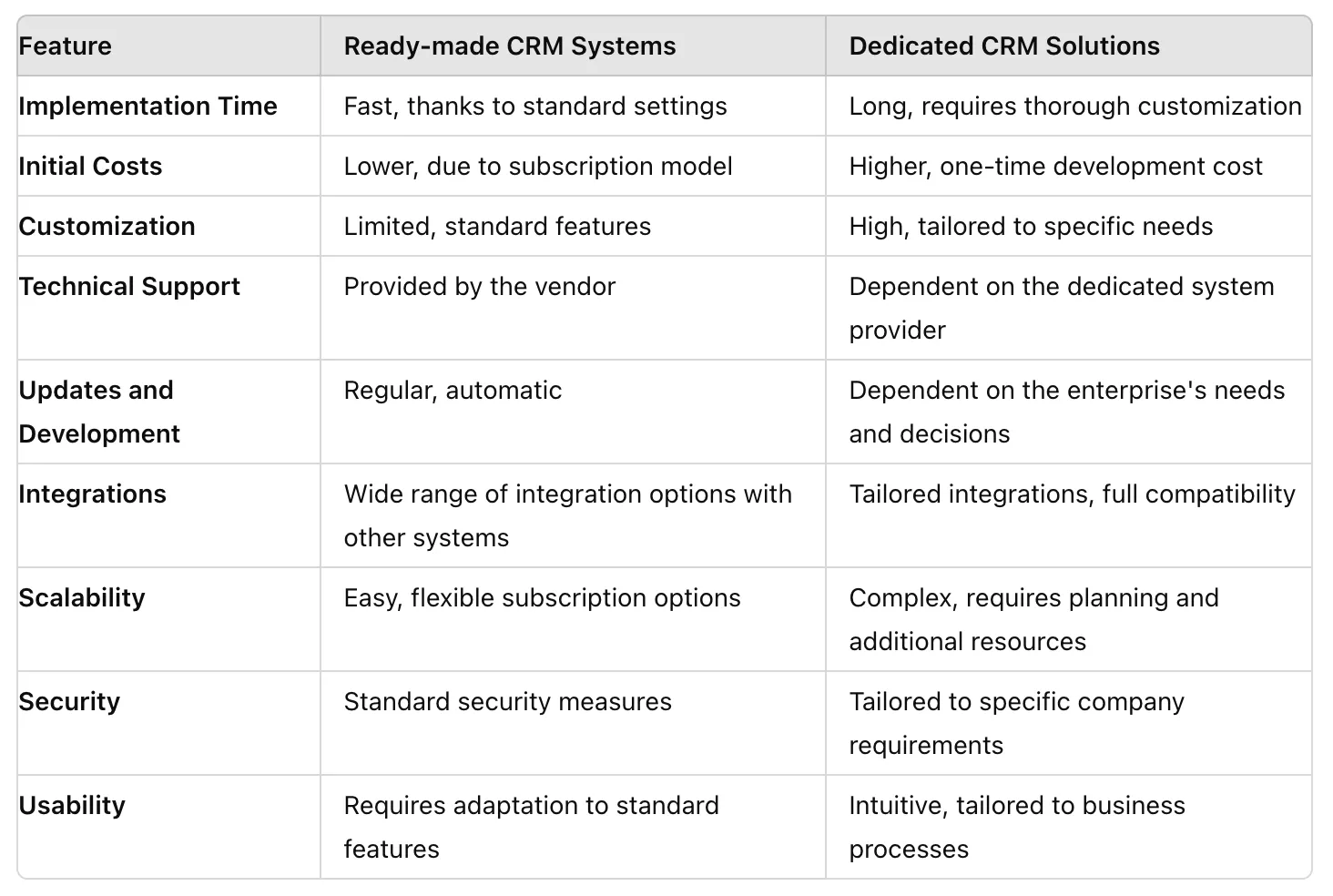
Pros and cons of ready-made CRM systems
.webp)
.webp)
Ready-made CRM solutions offer a rich array of features and are accessible to any enterprise. They enable the management of sales, marketing, data analysis, and customer service in one integrated environment. Additionally, consolidating customer inquiries from various channels into a single database streamlines the sales process.
Worldwide, companies from various industries use these systems to achieve success in international markets. Implementing a ready-made CRM solution requires careful consideration of many aspects. Like any system, CRMs have their advantages and disadvantages that can affect the operation of an enterprise.
In a CRM system, it is crucial to choose the right solution for small businesses. Understanding customer needs and gaining insight into their expectations, CRM can significantly improve business strategies.
Implementing appropriate platforms can significantly enhance business processes by increasing operational efficiency. Below is a presentation of how these systems can support business development and the challenges and difficulties associated with their implementation and use. It is also worth streamlining processes to increase conversions and business success.
Implementation Time
Ready-made CRM systems are designed to enable quick implementation. Many have standard settings that can be applied immediately, significantly reducing the time from purchase to full system functionality.
1. Technical Support
Most CRM solution providers offer technical support and training for users, which greatly facilitates both the implementation process and daily use of the system.
2. Lower Initial Costs
Ready-made CRM systems typically have lower initial costs compared to dedicated solutions. Thanks to the subscription model, companies can spread costs over a longer period, making them easier to manage.
3. Lower Infrastructure Maintenance Costs
In the case of cloud-based CRM systems, the provider is responsible for servers, updates, and security, which translates into minimized IT infrastructure maintenance costs for companies.
4. Rich Set of Features
Ready-made CRM solutions mostly come with extensive sets of features, including sales management, marketing, customer service, data analysis, and business process automation.
5. Integration with Various Systems
Many (but not all) CRM systems allow for simple integration with other solutions, such as ERP systems, e-commerce platforms, or marketing tools.
Cons of Ready-Made CRM Systems
1. Standard Solutions
Ready-made CRM systems may not meet all the requirements of a company. Limited customization options can reduce the system's effectiveness in specific business situations.
2. Dependence on the Provider
Companies using ready-made CRM solutions often rely on the provider for updates, technical support, and system development.
3. High Long-Term Costs
Initial costs of a ready-made CRM system are lower, but subscription fees can add up and become significant over time. Long-term costs of usage may exceed the one-time cost of a dedicated system.
Additionally, paying separately for additional modules, integrations, and technical support can increase the total cost of using the system, potentially surpassing the one-time cost of a tailor-made solution.
4. Complex Features
Ready-made CRM systems can be difficult to use, especially when they offer many advanced features. Training employees and adapting to new tools can require significant time and effort.
Adapting to the company's specifics and implementing a ready-made CRM solution may require changing existing and already established business processes, which is not always optimal.
5. Data Security and Privacy
Storing data in the cloud, which is common in ready-made CRM systems, can raise concerns about the security and privacy of information. Companies must rely on service providers for data security.
Additionally, companies operating in regulated industries must ensure that the CRM system meets all legal requirements for data storage and processing.
How to Implement a Ready-Made CRM System
Implementing a ready-made CRM system should begin with analyzing the company's needs and defining the goals and processes the system should support. Based on this analysis, choose a solution that best meets the company's needs and offers appropriate functionality and scalability.
It is worth preparing an implementation plan that includes a schedule of activities, project implementation stages, and resources needed for realization.
Before migrating data to the new system, identify the data sources to be transferred to the new system - this is a good moment to also check the quality of these data.
It is advisable to clean the data of duplicates and errors to ensure that only correct information is transferred to the new system. Data migration should be prepared according to the system's requirements. It is worth testing the data transfer process in a test environment before the final migration.
A very important part of the implementation is user training. Producers of ready-made CRM solutions usually provide documentation and training for users. Documentation includes detailed guides, instructions, and support materials to help fully utilize the system's features.
Additionally, training sessions are offered, which can be conducted in the form of workshops, webinars, or online training, allowing users to quickly learn how to operate and effectively use the tool.
Basic training is often included in the subscription price, but more advanced and tailored to the company's needs training sessions usually involve additional costs.
The next step in the implementation is integrating with existing company systems. Identify the systems with which the CRM will work. Develop an integration plan that includes technical aspects of system connection, such as data synchronization and compatibility.
Do not forget to conduct integration tests to ensure that all systems work together and data is correctly synchronized.
Finally, it is recommended to monitor the CRM system's performance and gather user feedback on its functions and efficiency - this will help identify any areas that need improvement.
When implementing a ready-made CRM solution, it is important to avoid several pitfalls:
Lack of Clear Goals and Requirements
Without precise definitions, it is difficult to assess whether the new system meets the company's actual needs.
Choosing a System Not Suited to the Company's Specifics
A wrong choice can lead to integration and efficiency problems. Read our post about all types of management systems here and choose the one best suited to your company.
Lack of Employee Engagement
If employees are not actively involved in the implementation process, it can result in delays and reduced efficiency.
Inadequate User Training
Insufficient preparation of the team can lead to improper use of the system, reducing its effectiveness and usefulness.
Integrating the New CRM System with Existing IT Solutions
Poorly conducted CRM integration with other systems used in the company can lead to difficulties in its operation and management.
Data errors, such as entering incomplete or incorrect information, can also negatively impact the system's functioning and data analysis.
Expecting Immediate Results
Implementing a CRM system takes time, and undue pressure can lead to disappointments and failures.
Salesforce CRM
It can be integrated with ERP systems such as SAP and Oracle ERP Cloud, allowing for the synchronization of financial and operational data. Integration with email marketing tools like Mailchimp and SendinBlue enables the automation of marketing campaigns and contact management directly from the CRM.
Salesforce also integrates with e-commerce platforms like Shopify and Magento, allowing for the synchronization of order and customer data. Additionally, Salesforce supports integrations with analytical systems like Tableau, enabling the creation of advanced reports and analyses based on CRM data.
Microsoft Dynamics 365 CRM
This system can be connected with email marketing tools like HubSpot and Constant Contact, enabling the management of email campaigns and contact synchronization. Dynamics 365 integrates with ERP systems like SAP and Oracle ERP Cloud, allowing for the synchronization of financial and operational data. Integration with e-commerce platforms like BigCommerce and WooCommerce allows for the synchronization of order and customer data.
Additionally, the system supports integrations with analytical tools like Power BI, enabling advanced reporting and data analysis.
HubSpot CRM
It can be integrated with email marketing tools like Mailchimp and SendinBlue, allowing for the automation of campaigns and contact list synchronization. HubSpot CRM integrates with ERP systems like NetSuite and SAP, allowing for the synchronization of operational and financial data. Integration with e-commerce platforms like BigCommerce and WooCommerce allows for the management of order and customer data. HubSpot CRM also supports integrations with analytical tools like Google Analytics, enabling the monitoring of campaign effectiveness and result analysis.
Pipedrive CRM
It can be integrated with email marketing tools like Mailchimp and SendinBlue, allowing for the synchronization of contact lists and monitoring of email campaigns. Pipedrive also integrates with e-commerce platforms like Shopify, facilitating the synchronization of transaction and customer data. Integration with project management tools like Asana and Trello enables the synchronization of tasks and deadlines, improving work organization and project management.
Insightly CRM
It can be connected with ERP systems like NetSuite, allowing for the synchronization of financial and operational data. Integration with email marketing tools like Mailchimp and SendinBlue enables the automation of campaigns and contact management. Insightly CRM also integrates with e-commerce platforms like Shopify, facilitating the synchronization of order and customer data.
Additionally, Insightly supports integrations with document management tools like Google Drive, making it easier to store and share documents.
Freshsales CRM
It can be integrated with ERP systems like NetSuite and SAP, allowing for the synchronization of financial and operational data. Integration with email marketing tools like ActiveCampaign and HubSpot enables the automation of campaigns and contact management. Freshsales CRM supports integrations with e-commerce platforms like Magento and Shopify, allowing for the synchronization of order and customer data.
Additionally, Freshsales integrates with analytical tools like Google Analytics, enabling advanced data analysis and campaign monitoring.


More like this


